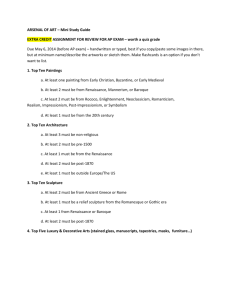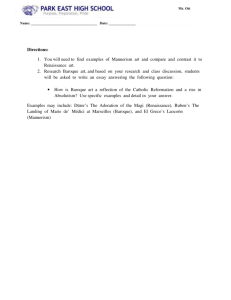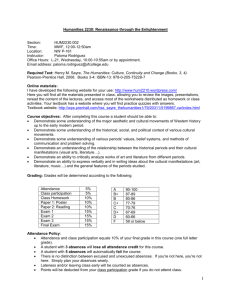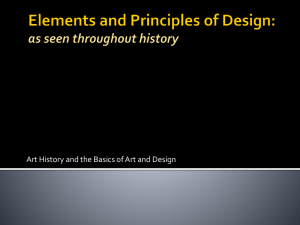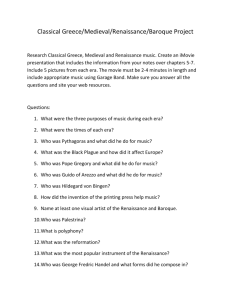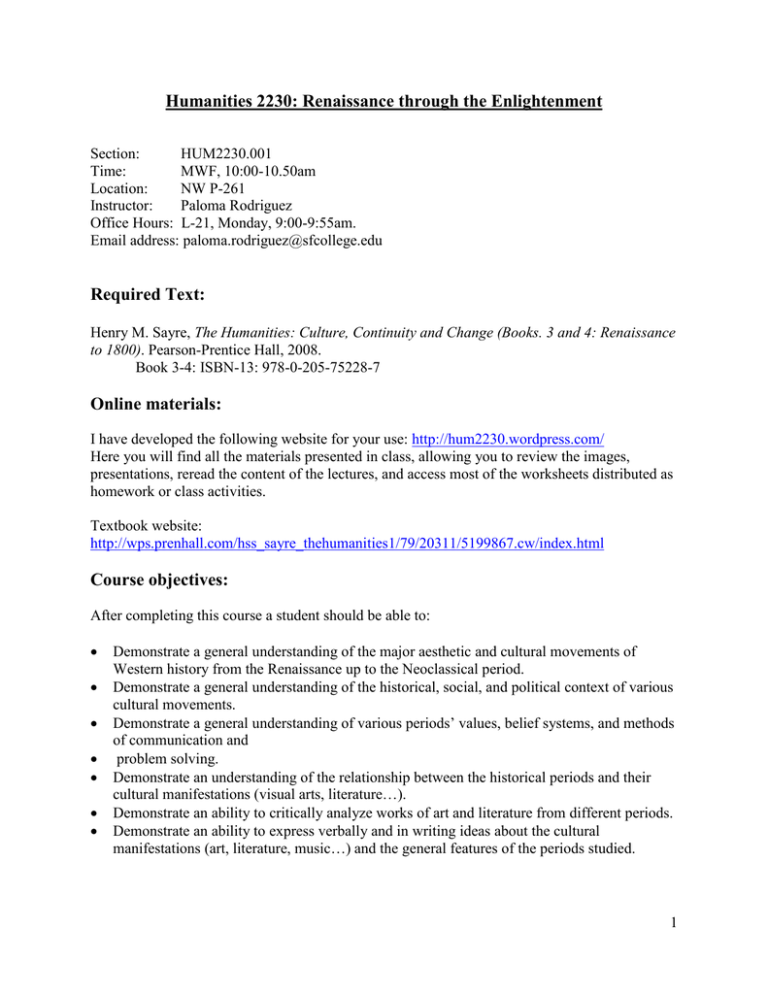
Humanities 2230: Renaissance through the Enlightenment
Section:
HUM2230.001
Time:
MWF, 10:00-10.50am
Location:
NW P-261
Instructor:
Paloma Rodriguez
Office Hours: L-21, Monday, 9:00-9:55am.
Email address: paloma.rodriguez@sfcollege.edu
Required Text:
Henry M. Sayre, The Humanities: Culture, Continuity and Change (Books. 3 and 4: Renaissance
to 1800). Pearson-Prentice Hall, 2008.
Book 3-4: ISBN-13: 978-0-205-75228-7
Online materials:
I have developed the following website for your use: http://hum2230.wordpress.com/
Here you will find all the materials presented in class, allowing you to review the images,
presentations, reread the content of the lectures, and access most of the worksheets distributed as
homework or class activities.
Textbook website:
http://wps.prenhall.com/hss_sayre_thehumanities1/79/20311/5199867.cw/index.html
Course objectives:
After completing this course a student should be able to:
Demonstrate a general understanding of the major aesthetic and cultural movements of
Western history from the Renaissance up to the Neoclassical period.
Demonstrate a general understanding of the historical, social, and political context of various
cultural movements.
Demonstrate a general understanding of various periods’ values, belief systems, and methods
of communication and
problem solving.
Demonstrate an understanding of the relationship between the historical periods and their
cultural manifestations (visual arts, literature…).
Demonstrate an ability to critically analyze works of art and literature from different periods.
Demonstrate an ability to express verbally and in writing ideas about the cultural
manifestations (art, literature, music…) and the general features of the periods studied.
1
Grading:
Grades will be determined according to the following:
Attendance/ cp
Class Homework
Paper 1
Paper 2
Exam 1
Exam 2
Exam 3
Final Exam
A
B+
B
C+
C
D+
D
F
10%
5%
10 %
10 %
15%
15%
15%
20%
90-100
87-89
80-86
77-79
70-76
67-69
60-66
59 or below
N.B.: Students become eligible for a grade of I (Incomplete) only in cases of serious emergency
and only after successful completion of 75 % of the course.
Attendance Policy:
I expect that all students will be prepared for and attend every class. These are some of the
reasons why you should attend every class:
1. Each lesson will supplement and enrich text materials through films, presentations, lectures,
and discussions. This information cannot always be found in your textbook. If you miss class
you will be missing an important part of the coursework, and your performance in exams is
likely to suffer because of it.
2. Classroom attendance will facilitate your learning enormously by helping you to summarize
and process the information from the textbook. Actually you will be saving in study time by
coming to class!
3. Besides, since class attendance is so important, the Department of Humanities and Foreign
Languages has mandated the following attendance policy:
Attendance equals 10 % of your final grade in this course (one full letter grade).
A student with 2 absences will lose all attendance credit for this course.
2
A student with 4 absences will automatically fail the course.
There is no distinction between excused and unexcused absences. If you're not here,
you're not here. Simply plan your absences wisely.
Lateness and/or leaving class early will be counted as absences.
Class participation
While in class you are expected to interact with peers and participate in discussions. This class
will demand your involvement. It will not consist of lectures alone. You will be asked to
participate in class activities which will be performed sometimes individually and sometimes in
groups. If you are reluctant to participate, you may lose points from your attendance grade.
Look at these policies from the bright side. By coming to class every day, bringing
your homework, and participating in class activities you will be given 16 points
gratis towards your final grade! On top of that you will be actually reducing the
amount of study you would have to do on your own if you didn’t attend class.
Homework
a) Daily Class Assignments:
Before every class you will have to read a number of pages form the textbook. Along with this
reading assignment I will give you a handout with exercises to help you assimilate the most
important information in each chapter. Occasionally I will assign additional readings and/or
handouts.
I expect you to show a reasonable recollection and understanding of the concepts discussed in
the handout and textbook when you come to class. If you fail to show such understanding and/or
you do not bring your completed homework to class, points will be deducted from your
homework and class participation grades.
b) Papers:
In addition to the three examinations and the final exam, you will also have to write two essay
papers.
For this assignment you will have to write two 600 word essays about a subject related to class
material. You will have to choose a topic, read about it in scholarly sources and produce essay
that are informative, concise, well structured and properly written.
Specific guidelines for these assignments will be provided during the course.
3
N.B.: The Gordon Rule requirement for this course will be met partially through these cultural
event papers, as well as through the examinations. Satisfactory completion of these writing
assignments is a prerequisite to successful completion of this course.
Academic Honesty Policy:
Academic dishonesty is not accepted in any class at Santa Fe Community College, and I will
vigorously pursue and prosecute any instances of such dishonesty. One extremely serious
offense you must avoid is plagiarism, or using the research, ideas or words of others as your own
without giving proper credit to your source. I will not tolerate plagiarism or cheating of any
sort. Students who cheat or plagiarize written material in any way will receive an automatic zero
on the assignment and will fail the course. This policy especially includes copying or
paraphrasing written materials from gallery brochures, play programs, books, periodicals,
encyclopedias, CD-ROMs, the Internet, or someone else’s paper. By the act of submitting
written work or an examination, the student signifies that he or she understands the definition of
academic dishonesty and is willing to accept the consequences for any violation.
Examinations:
There will be three unit exams, composed of both short questions (true-false, multiple choice
…), and essay questions. Make-up exams will NOT be given unless truly extraordinary
circumstances arise. Adequate documentation will be required. No final exam will be given
early.
Final Exam Date: 12/06/2010 Time: 10:30 AM to 12:30 PM Campus: NW Bldg/Room: P-261
4
Schedule:
TOPIC
August
Week 1
23
25
27
Week 2
30
September
1
3
Week 3
6
8
10
Week 4
13
15
17
Week 5
20
22
24
Week 6
27
29
October
1
REQUIRED READINGS
Introduction. Florence and the Early
Renaissance
Florence and the Early Renaissance
Florence and the Early Renaissance
Chapter 17, pp. 537-579
The High Renaissance in Rome
Chapter 18, pp. 581-607
The High Renaissance in Rome
The High Renaissance in Rome
Chapter 18, pp. 581-607
Chapter 18, pp. 581-607
Labor Day. No class.
The Venetian Renaissance.
The Venetian Renaissance.
Chapter 19, pp. 609-635
Chapter 19, pp. 609-635
Exam 1. The Renaissance in the North
The Renaissance in the North
The Renaissance in the North
Chapter 20, pp. 637-665
Chapter 20, pp. 637-665
Chapter 20, pp. 637-665
The Reformation
The Reformation
The Reformation
Chapter 21, pp. 669-695
Chapter 21, pp. 669-695
Chapter 21, pp. 669-695
Counter-Reformation and Mannerism
Counter-Reformation and Mannerism
Chapter 22, pp. 697-728
Chapter 22, pp. 697-728
Paper 1 due. Counter-Reformation and
Mannerism
Chapter 22, pp. 697-728
England in the Tudor Age
England in the Tudor Age
England in the Tudor Age
Chapter 24, pp. 763-799
Chapter 24, pp. 763-799
Chapter 24, pp. 763-799
Exam 2. The Baroque in Italy
The Baroque in Italy
UF Homecoming. No class.
Chapter 25, pp. 805-831
Chapter 25, pp. 805-831
The Baroque in Italy
The Secular Baroque in the North
The Secular Baroque in the North
Chapter 25, pp. 805-831
Chapter 26, pp. 833-861
Chapter 26, pp. 833-861
Chapter 17, pp. 537-579
Chapter 17, pp. 537-579
Week 7
4
6
8
Week 8
11
13
15
Week 9
18
20
22
Week 10
5
25
27
29
November
Week 11
1
3
5
The Baroque Court
The Baroque Court
The Baroque Court
Chapter 27, pp. 863-895
Chapter 27, pp. 863-895
Chapter 27, pp. 863-895
Exam 2. The Rise of the Enlightenment
in England
The Rise of the Enlightenment in
England
The Rococo and the Enlightenment in
the Continent.
Chapter 28, pp. 897-931
The Rococo and the Enlightenment in
the Continent.
Veteran’s day. No class.
The Rococo and the Enlightenment in
the Continent. Paper 2 due.
Chapter 29, pp. 933-967
Chapter 28, pp. 897-931
Chapter 29, pp. 933-967
Week 12
8
10
12
Week 13
15
17
19
Week 14
22
24
26
Week 15
29
December
1
3
Week 16
6
Chapter 29, pp. 933-967
Cross Cultural Encounter/ Rights of Men Chapter 30-31, pp. 969-1021
(WHF)
Cross Cultural Encounter/ Rights of Men Chapter 30-31, pp. 969-1021
(WHF)
Cross Cultural Encounter/ Rights of Men Chapter 30-31, pp. 969-1021
(WHF)
Exam 3.
Thanksgiving Holiday. No class
Thanksgiving Holiday. No class
A Culture of Change in France
Chapter 32, pp. 1023-1047
A Culture of Change in France
Review
Chapter 32, pp. 1023-1047
Final Exam
6

